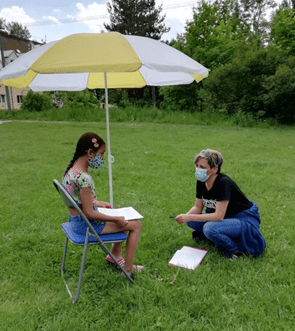Slovakia: Will EU Try Slovakia for Segregating Roma Children in School?
Romani children are also routinely being assessed as having “mild mental disabilities” and sent to special schools where the quality of education is inferior, a joint Amnesty and ERRC statement said.
The European Commission on April 19 brought Slovakia, an EU Member State, to the European Court of Justice for violating the Race Equality Directive through its provision on segregated schooling for Roma children.
This is the first time a Member State has been charged before the European Court of Justice on a matter of racial discrimination.
The charge is that Slovakia's provision of segregated school education for children from the Roma community is a violation of their educational rights, imposing on them racist and poor-quality schooling.
The racial discrimination of Roma children emanates from a history of discrimination the Roma community face in European societies. While some Roma are still itinerant, many others work as unskilled wage labourers, especially as artisans (for example, wood and copper craft workers), farm workers, blacksmiths, musicians, fortune-tellers and entertainers. The stigma tells as very often, these occupations, often considered menial, are identified with the Roma.
The Roma people of Europe are an example of communities discriminated on work and descent (CDWD). Roma populations are systemically disadvantaged in their access to basic services. For example, findings from the EU Minorities and Discrimination survey carried out in 2016 show that one in every three Roma live in housing without safe drinking water.
Slovakia's discrimination against school-going Roma children was first brought up in 2015. The country's government has since undertaken to amend legislation and desegregate its schools. Yet, two of every three school-going Roma children still study in segregated schools according to findings by the European Union Agency for Fundamental Rights. The findings are based on FRA's 2021 survey on Roma people in Croatia, Czechia, Greece, Hungary, Italy, Portugal, Romania and Spain, as well as in North Macedonia and Serbia. The survey included interviews with over 8,400 Roma, collecting information on more than 20,000 individuals.
Earlier in 2017, the European Roma Rights Centre (ERRC) and Amnesty International drew attention not only to the segregation of Romani children, but to the poor quality of education offered and to the practice of misdiagnosing Romani children with mental and learning difficulties and placing them in so-called “special schools.”
The report titled A Lesson in Discrimination: Segregation of Romani children in Primary Education in Slovakia, spoke of how Romani children in Slovakia were being failed by a discriminatory primary school system that segregated them and seriously hindered their education, condemning them to lives of poverty and exclusion.
Romani children are also routinely being assessed as having “mild mental disabilities” and sent to special schools where the quality of education is inferior, a joint Amnesty and ERRC statement said.
Employment lower down the workplace hierarchy is a discrimination that Roma people have had to live with. This discrimination on descent translates to the workplace as well. For instance, the ERRC and Amnesty International's investigations even found that for many Roma who managed to get placements on vocational courses, rather than completing skills or trade-based training, they were used as little more than slave labour. Boys enrolled at a private secondary vocational school run by a nearby manufacturing company described to researchers how they spent most of their time putting together electric plugs which the company then sold.
Girls at the same school were offered “Practical Woman” (Praktická Žena) lessons, part of a nationwide programme in which Romani girls were taught to become “good housewives” with lessons in cooking and housework. The organisations used the evidence to push for the reasoned opinion from the Commission, the final step before the recent case taken before the European Court of Justice.


